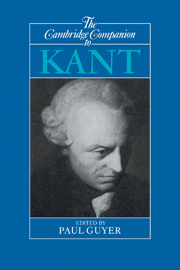Book contents
- Frontmatter
- Introduction
- 1 Kant's intellectual development
- 2 The Transcendental Aesthetic
- 3 Functions of thought and the synthesis of intuitions
- 4 The transcendental deduction of the categories
- 5 Causal laws and the foundations of natural science
- 6 Empirical, rational, and transcendental psychology
- 7 Reason and the practice of science
- 8 The critique of metaphysics
- 9 Vindicating reason
- 10 Autonomy, obligation, and virtue
- 11 Politics, freedom, and order
- 12 Taste, sublimity, and genius
- 13 Rational theology, moral faith, and religion
- 14 The first twenty years of critique
- Bibliography
- Index
4 - The transcendental deduction of the categories
Published online by Cambridge University Press: 28 May 2006
- Frontmatter
- Introduction
- 1 Kant's intellectual development
- 2 The Transcendental Aesthetic
- 3 Functions of thought and the synthesis of intuitions
- 4 The transcendental deduction of the categories
- 5 Causal laws and the foundations of natural science
- 6 Empirical, rational, and transcendental psychology
- 7 Reason and the practice of science
- 8 The critique of metaphysics
- 9 Vindicating reason
- 10 Autonomy, obligation, and virtue
- 11 Politics, freedom, and order
- 12 Taste, sublimity, and genius
- 13 Rational theology, moral faith, and religion
- 14 The first twenty years of critique
- Bibliography
- Index
Summary
In the preface to the first edition of the Critique of Pure Reason, published in 1781, Kant wrote:
I know of no investigations that would be more important for getting to the bottom of the faculty that we call understanding and at the same time for determining the rules and limits of its employment than those that I have undertaken in the second part of the Transcendental Analytic, under the title of the Deduction of the Pure Concepts of the Understanding; they have also cost me the most, but not, I hope, unrewarded effort.” (A XVI)
However, the initial response to Kant's argument, which he also titled the “transcendental deduction of the categories” (A 85 /B 117), was largely one of incomprehension, and in the preface to the Metaphysical Foundations of Natural Science, published in 1786, Kant himself acknowledged that precisely “that part of the Critique which should have been the clearest was the most obscure, or even revolved in a circle” (4:474 n.). So in the second edition of the Critique, published the following year, Kant completely rewrote the transcendental deduction. He claimed that this revision touched only the manner of “presentation,” not the “propositions themselves and their grounds of proof” (B xxxvii-xxxviii). But in spite of Kant's efforts at clarification, the intervening two centuries have brought little agreement in the interpretation of the deduction, even on the fundamental question of whether the two editions of the Critique, in 1781 and 1787, try to answer the same question by means of the same argument. The last three decades alone have brought forth dozens of competing interpretations or “reconstructions” of Kant's transcendental deduction.
- Type
- Chapter
- Information
- The Cambridge Companion to Kant , pp. 123 - 160Publisher: Cambridge University PressPrint publication year: 1992
- 19
- Cited by



